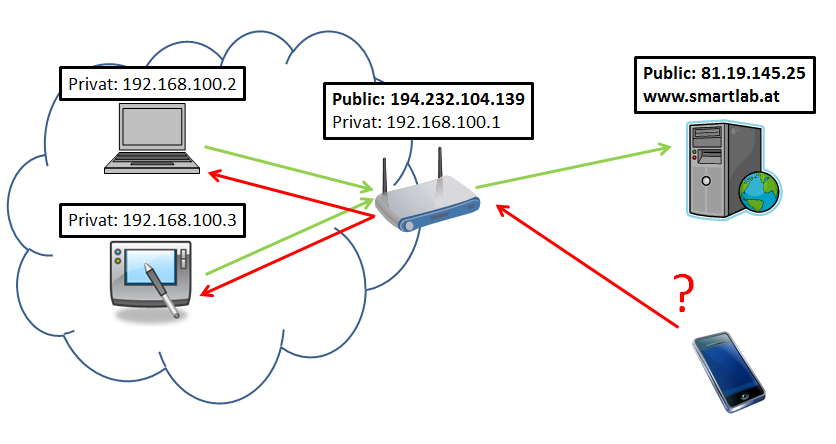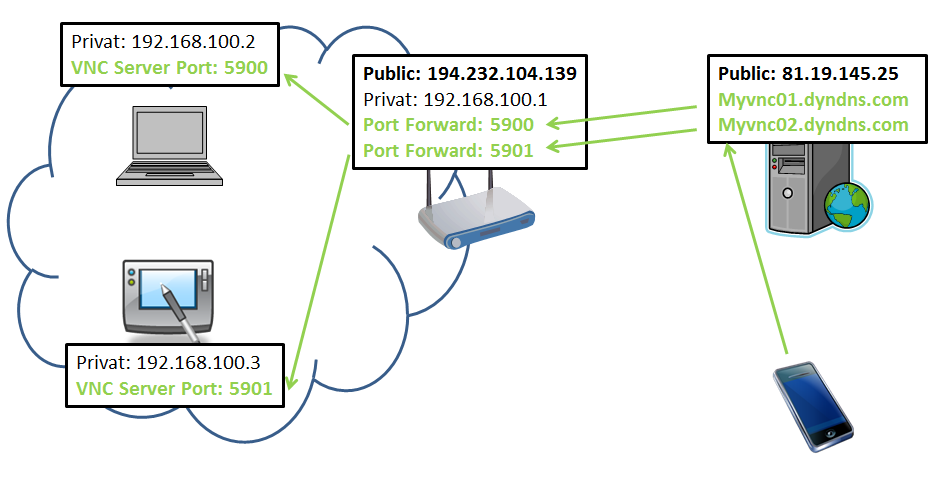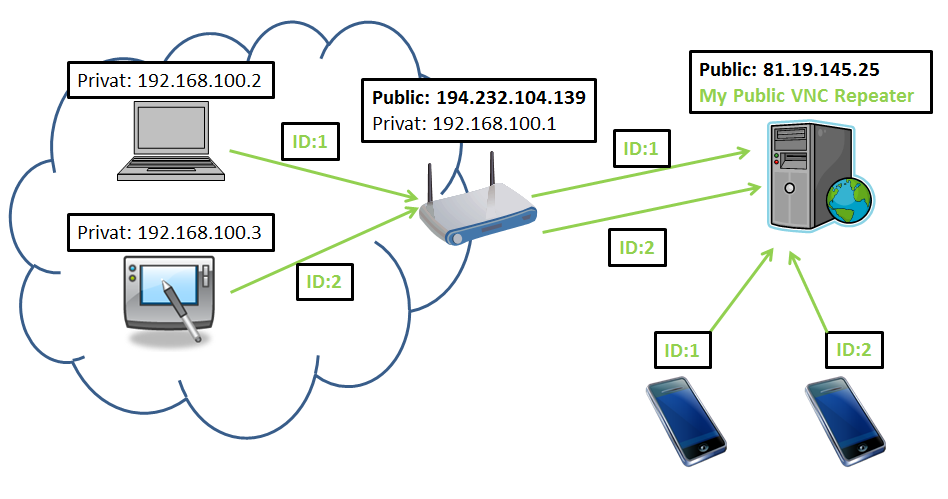Using VNC behind a firewall or a NAT router without public IP available can be a huge challenge for remote control and maintenance tasks. As local networks operate on their own network address space, these IP network addresses are not known to the public Internet and therefore not directly accessible from outside the private network of your company. Typically, companies access and route the Internet connection for their private networks over a single Router/Gateway and Firewall which receives a permanent or a dynamically changing public IP address. This means that a PC with a private network address within your company is able to access any public IP address within the Internet by routing over your companies public IP Gateway/Router, but the other way its not possible to directly access the private IP address within your companies network.
Generally its impossible to directly access a VNC server running behind a Firewall or a NAT Router, but there are several technical possibilities to overcome this challenge.
Port Forwarding
A common method that is used for many different remote access purposes, such as accessing a private address of your webcam from all over the world, is to configure port forwarding on your router/gateway. Port forwarding allows remote computers (for example, computers on the Internet) to connect to a specific computer or service within a private local-area network (LAN). In a typical private network, computers obtain Internet access through a DSL or cable modem connected to a router or network address translator (NAT/NAPT). Hosts on the private network are connected to an Ethernet switch or communicate via a wireless LAN. The NAT device’s external interface is configured with a public IP address. The computers behind the router, on the other hand, are invisible to hosts on the Internet as they each communicate only with a private IP address.
When configuring port forwarding, the network administrator sets aside one port number on the gateway for the exclusive use of communicating with a service in the private network, located on a specific host. External hosts must know this port number and the address of the gateway to communicate with the network-internal service. Often, the port numbers of well-known Internet services, such as port number 80 for web services (HTTP), are used in port forwarding, so that common Internet services may be implemented on hosts within private networks.
Listening VNC Client with public IP
By triggering the connection from inside a private network it is possible to establish a connection to a waiting (listening mode) vnc viewer. With UltraVNC for example you can start the viewer in listening mode by typing ultravnc.exe -listen. The constraint for accessing a listening vnc viewer is of course that the network address of the viewer can be accessed by the server. So the vnc viewer has to run on a public IP address.
Public VNC Repeater:
The same way as Skype or TeamViewer are operating is also possible in combination with VNC. Skype and TeamViewer are routing both connections over a central, globally available server with public IP address. So both sides, the server as well as the client can operate on private IP addresses and connect to each other by using the central server. Within the VNC world this concept/software is called a VNC repeater server. VNC repeater servers are responsible for accepting both connections from VNC clients as well as from VNC servers. Typically the VNC repeater accepts VNC clients/viewers on port 5900 and connections coming from your VNC server on port 5500. Both sides have to agree on a common connection ID in order to enable the VNC repeater to distinguise which viewer connection should be connected with which server connection.
You can find free implementations for VNC repeater software from UltraVNC and another implementation on Google Code.
If you are operating a remote maintenance service its strongly advised to setup your own VNC repeater on your own publicly accessable server!
There are also some free VNC repeaters running online, where you can start to test out such a scenario without setting up your own VNC repeater: http://repeaters.ultravnc.info/
MobileVNC, Windows CE and Windows Embedded Compact VNC Server also supports the automatic reconnect to listening VNC viewers or to VNC Repeaters.



It is actually a great and helpful piece of information. I’m satisfied that you simply shared this helpful info with us. Please keep us up to date like this. Thank you for sharing.
What i do not understood is in reality how you’re now not actually much more neatly-preferred than you might be right now. You’re so intelligent. You know therefore significantly when it comes to this subject, made me in my view consider it from a lot of varied angles. Its like women and men aren’t involved unless it is something to do with Woman gaga! Your individual stuffs excellent. Always take care of it up!
Hello there! Do you use Twitter? I’d like to follow you if that would be ok. I’m definitely enjoying your blog and look forward to new updates.
Incredible story there. What happened after? Thanks!
Do you mind if I quote a few of your posts as long as I provide credit and sources back to your website? My blog site is in the very same area of interest as yours and my visitors would really benefit from some of the information you provide here. Please let me know if this alright with you. Regards!
My brother recommended I might like this website. He was totally right. This post truly made my day. You can not imagine simply how much time I had spent for this info! Thanks!
Hello! Someone in my Myspace group shared this website with us so I came to take a look. I’m definitely loving the information. I’m book-marking and will be tweeting this to my followers! Superb blog and excellent style and design.
Pretty! This was an incredibly wonderful post. Many thanks for supplying this information.
Hurrah, that’s what I was seeking for, what a stuff! existing here at this website, thanks admin of this site.
After going over a few of the blog articles on your site, I honestly like your technique of blogging. I added it to my bookmark webpage list and will be checking back in the near future. Take a look at my web site too and tell me how you feel.
Hey there, You’ve done a fantastic job. I will definitely digg it and personally recommend to my friends. I’m sure they’ll be benefited from this web site.
I was extremely pleased to uncover this website. I want to to thank you for your time due to this wonderful read!! I definitely loved every part of it and I have you book marked to look at new information in your site.
Hi there outstanding blog! Does running a blog similar to this require a lot of work? I have absolutely no understanding of computer programming however I had been hoping to start my own blog in the near future. Anyway, should you have any ideas or tips for new blog owners please share. I understand this is off subject but I just had to ask. Cheers!
Fine way of describing, and nice paragraph to get facts on the topic of my presentation focus, which i am going to deliver in college.
What’s Going down i’m new to this, I stumbled upon this I’ve found It absolutely useful and it has aided me out loads. I hope to contribute & help other customers like its aided me. Good job.
WOW just what I was searching for. Came here by searching for %keyword%
I am regular visitor, how are you everybody? This article posted at this web page is in fact pleasant.
I enjoy reading an article that can make men and women think. Also, thank you for allowing for me to comment!
Good post. I learn something new and challenging on blogs I stumbleupon everyday. It will always be interesting to read content from other writers and practice something from their sites.
I love looking through an article that will make men and women think. Also, many thanks for allowing me to comment!
Everyone loves what you guys are usually up too. This sort of clever work and coverage! Keep up the wonderful works guys I’ve incorporated you guys to our blogroll.
Awesome article.
I am curious to find out what blog system you have been working with? I’m having some small security problems with my latest site and I would like to find something more safe. Do you have any recommendations?
Spot on with this write-up, I really think this web site needs a lot more attention. I’ll probably be returning to read through more, thanks for the information!
Very descriptive article, I loved that a lot. Will there be a part 2?
Excellent blog here! Additionally your website rather a lot up fast! What web host are you using? Can I get your affiliate link to your host? I desire my site loaded up as fast as yours lol
Hello, I enjoy reading through your article post. I wanted to write a little comment to support you.
This web site really has all the info I needed about this subject and didn’t know who to ask.
I love reading through an article that can make people think. Also, thanks for allowing me to comment!
Unquestionably believe that which you said. Your favorite reason seemed to be on the web the simplest thing to be aware of. I say to you, I definitely get annoyed while people consider worries that they just do not know about. You managed to hit the nail upon the top and defined out the whole thing without having side effect , people could take a signal. Will probably be back to get more. Thanks
Quality articles is the key to interest the visitors to pay a visit the website, that’s what this web site is providing.
Does your website have a contact page? I’m having problems locating it but, I’d like to shoot you an e-mail. I’ve got some recommendations for your blog you might be interested in hearing. Either way, great site and I look forward to seeing it expand over time.
My family always say that I am killing my time here at web, except I know I am getting familiarity daily by reading such good articles or reviews.
It’s enormous that you are getting ideas from this paragraph as well as from our discussion made here.
It’s a shame you don’t have a donate button! I’d definitely donate to this excellent blog! I guess for now i’ll settle for bookmarking and adding your RSS feed to my Google account. I look forward to new updates and will share this blog with my Facebook group. Talk soon!
What’s up to all, the contents present at this website are genuinely amazing for people knowledge, well, keep up the good work fellows.
Hi to all, the contents present at this site are in fact amazing for people experience, well, keep up the nice work fellows.
Thank you for sharing your thoughts. I really appreciate your efforts and I am waiting for your next post thank you once again.
Thanks for every other great post. The place else may just anyone get that kind of info in such a perfect method of writing? I have a presentation next week, and I’m on the search for such info.
For newest information you have to visit internet and on the web I found this site as a finest web page for hottest updates.
An impressive share! I’ve just forwarded this onto a friend who has been conducting a little research on this. And he actually bought me lunch due to the fact that I discovered it for him… lol. So let me reword this…. Thanks for the meal!! But yeah, thanx for spending the time to discuss this topic here on your web site.
Undeniably believe that which you stated. Your favorite reason seemed to be on the internet the easiest thing to be aware of. I say to you, I certainly get irked while people consider worries that they just do not know about. You managed to hit the nail upon the top as well as defined out the whole thing without having side effect , people could take a signal. Will likely be back to get more. Thanks
Link exchange is nothing else however it is only placing the other person’s website link on your page at appropriate place and other person will also do similar in favor of you.
Hey there! Would you mind if I share your blog with my twitter group? There’s a lot of people that I think would really appreciate your content. Please let me know. Cheers
Write more, thats all I have to say. Literally, it seems as though you relied on the video to make your point. You clearly know what youre talking about, why waste your intelligence on just posting videos to your weblog when you could be giving us something enlightening to read?
Hurrah! After all I got a blog from where I be able to actually get valuable facts concerning my study and knowledge.
Awesome post.
Heya i’m for the first time here. I came across this board and I find It really useful & it helped me out a lot. I hope to give something back and help others like you aided me.
Good day very cool web site!! Man .. Excellent .. Superb .. I’ll bookmark your site and take the feeds also? I’m happy to search out so many useful info right here in the submit, we need develop extra techniques in this regard, thanks for sharing. . . . . .
Awesome! Its really amazing paragraph, I have got much clear idea about from this post.